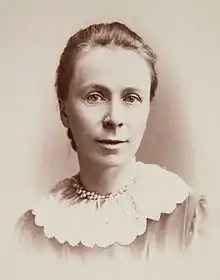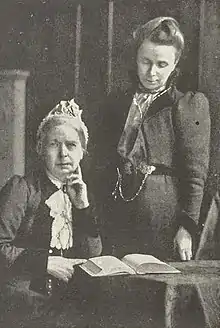Sophie Bryant
Sophie Willock Bryant (15 February 1850, Sandymount, Dublin, – 14 August 1922, Chamonix, France) was an Anglo-Irish mathematician, educator, feminist and activist.[1]
Sophie Bryant | |
|---|---|
 Sophie Bryant | |
| Born | 15 February 1850 Sandymount, Dublin |
| Died | 14 August 1922 (aged 72) Chamonix, France |
| Occupation | Mathematician and Educator |
Early life and education
Bryant was born Sophie Willock in Dublin in 1850. Her father was Revd Dr William Willock DD, Fellow and Tutor of Trinity College, Dublin. She was educated at home, largely by her father. As a teenager she moved to London, when her father was appointed Professor of Geometry at the University of London in 1863, and she attended Bedford College. At the age of nineteen she married Dr William Hicks Bryant, a surgeon ten years older than she was, who died of cirrhosis within a year.[2][3]
Career

In 1875 Bryant became a teacher and was invited by Frances Mary Buss to join the staff of North London Collegiate School. In 1895 she succeeded Miss Buss as headmistress of North London Collegiate, serving until 1918.[2][3]
When the University of London opened its degree courses to women in 1878, she became one of the first women to obtain First Class Honours, in Mental and Moral Sciences, together with a degree in mathematics in 1881, and three years later was awarded the degree of Doctor of Science. In 1882 she was the third woman to be elected to the London Mathematical Society, and was the first active female member, publishing her first paper with the Society in 1884.[2][3] Together with Charles Smith, Bryant edited three volumes of Euclid's Elements of Geometry, for the use of schools (Euclid's Elements of Geometry, books I and II (1897); Euclid's Elements of Geometry, books III and IV (1899); Euclid's Elements of Geometry, books VI and IX (1901)).[4]
Sophie Bryant was a pioneer in education for women. She was the first woman to receive a DSc in England; one of the first three women to be appointed to a Royal Commission, the Bryce commission on Secondary Education in 1894–1895; and one of the first three women to be appointed to the Senate of the University of London. When Trinity College Dublin opened its degrees to women, Bryant was one of the first to be awarded an honorary doctorate. She was also instrumental in setting up the Cambridge Training College for Women, now Hughes Hall, Cambridge.[2][3] She is also said to have been one of the first women to own a bicycle.[2]
She was interested in Irish politics, wrote books on Irish history and ancient Irish law (Celtic Ireland (1889), The Genius of the Gael (1913)), and was an ardent Protestant Irish nationalist. She was president of the Irish National Literary Society in 1914. She supported women's suffrage but advocated postponement until women were better educated.[2][3][5]
Later life and death
Bryant loved physical activity and the outdoors. She rowed, cycled, and swam, and twice climbed the Matterhorn.[6] She died in a hiking accident in the Alps in 1922, age 72.[2][3]
References
- Sophie Bryant, D.Sc., Litt.D. 1850–1922 (PDF). North London Collegiate School. 1922. Archived from the original (PDF) on 24 October 2016.
- Peter Berresford Ellis (10 December 2008). "Sophie Bryant (part 1)". Irish Democrat. Connolly Publications Ltd. Archived from the original on 6 October 2008. Retrieved 16 November 2012.
- O'Connor, John J.; Robertson, Edmund F., "Sophie Bryant", MacTutor History of Mathematics archive, University of St Andrews.
- "Catalog Record: Euclid's elements of geometry: books I-IV, VI and XI". Hathi Trust Digital Library. Archived from the original on 24 October 2017. Retrieved 20 July 2017.
- Peter Berresford Ellis (10 December 2008). "Sophie Bryant (part 2)". Irish Democrat. Connolly Publications Ltd. Archived from the original on 1 October 2008. Retrieved 16 November 2012.
- Rosita Boland (23 August 2016). "Sophie Bryant, mathematician and pioneer of education for women". Irish Times. Archived from the original on 24 August 2016. Retrieved 23 August 2016.
Further reading
- Rothman, P. (January 2003). "'So work the honey bees………building roofs of gold': the story of Sophie Bryant". The London Mathematical Society Newsletter. 311: 14–16.
